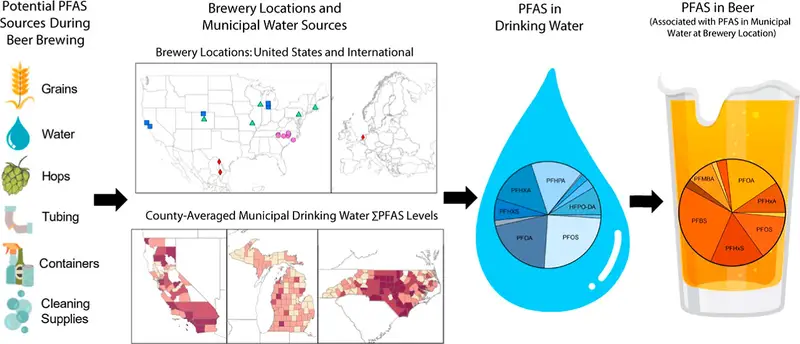Adapted testing method indicates another potential consumer exposure to “forever chemicals”
RESEARCH TRIANGLE PARK, N.C. — Curious about how local water quality could affect your next happy hour? Researchers at RTI International, an independent scientific research institute, just published a new study in Environmental Science & Technology showing that the presence of "forever chemicals" in municipal water gets into the beer production process — and the beer itself.
The Environmental Science & Technology journal article, titled "Hold My Beer: The Linkage between Municipal Water and Brewing," explores how chemical contaminants known as per- and polyfluoroalkyl substances — or PFAS — pose a challenge for drinking water utilities and breweries across the U.S. and globally.
"RTI’s ‘Hold My Beer’ study highlights the need for broad, coordinated action to reduce PFAS in water supplies,” said Jennifer Hoponick Redmon, lead study researcher and senior director of environmental health and water quality at RTI. “Our adapted testing method offers a practical way to detect and address PFAS in beverages including beer, which we hope can reduce exposure to these chemicals and make future happy hours relatively safer and healthier."
This is the first study to adapt an established PFAS testing method for drinking water for beer analysis and evaluate how municipal drinking water at brewing locations influences PFAS presence in beer.
Key findings from the research include:
- PFAS Detection: PFAS were detected in most beers, particularly from smaller breweries near contaminated water sources. These beers had a higher likelihood of PFAS presence compared to larger-scale U.S. or international beers.
- Variability in Contamination: PFAS contamination was variable, even within six-packs of the same beer. Despite reduced use of longer-chain PFAS compounds, both PFOA and PFOS are still found in beers.
- Firefighting Foam Connection: PFAS compounds linked to firefighting foam, such as PFSAs and PFBS, were commonly found in beers, indicating widespread environmental transport.
- Regional Differences: Beers from North Carolina exhibited higher PFAS species variety compared to Michigan and California.
- Actionable Steps: Consumers can prioritize choosing beers from breweries without PFAS in municipal drinking water, or that conduct testing and use water filtration that removes PFAS. Water utilities can enhance water treatment processes to remove PFAS contaminants before distribution, and breweries can test or filter their brewing water.

RTI researchers evaluated PFAS compounds in beers purchased in retail stores and compared results with municipal water data to determine if contamination was associated with the water supply. The study was conducted at brewing locations in 17 U.S. counties, nine states and three countries.
PFAS are human-made chemicals produced for their anti-grease, water-resistant, and stain-repelling properties. Recent studies show that PFAS exposure can lead to adverse reproductive, developmental, cardiovascular, liver, kidney, immunological and carcinogenic health effects. Nearly every American has PFAS in their blood, indicating that exposure is common. Consumption of contaminated drinking water is a major, if not the primary contributor to total exposure.
Supporting breweries and water utilities in addressing PFAS paves the way for future advancements in water quality and food safety.
More information is available about how exposure to contaminants is identified and reduced in the places where people live, learn, work and play through RTI CleanPlus™, a portfolio of environmental health and water quality programs.
RTI has in-house capabilities spanning PFAS research, including assessment, testing, remediation and identification of alternatives.

RTI International Media Relations:
As an independent, scientific research institute with a mission to improve the human condition, RTI International is engaged by clients and partners to conduct evidence-based research and project implementation. We share our work in line with journalistic and scientific standards and maintain a record in RTI’s Newsroom.
RTI International is an independent scientific research institute dedicated to improving the human condition. Our vision is to address the world's most critical problems with technical and science-based solutions in pursuit of a better future. Clients rely on us to answer questions that demand an objective and multidisciplinary approach—one that integrates expertise across social, statistical, data, and laboratory sciences, engineering, and other technical disciplines to solve the world’s most challenging problems.
For more information, visit www.rti.org.




